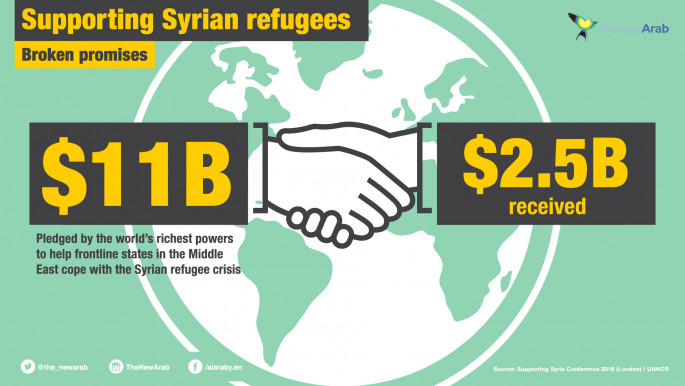Russian planes bomb Syrian refugee camp on Jordan border
War planes, believed to be Russian, targeted a makeshift refugee camp along Jordan's northeastern border with Syria on Tuesday, killing at least 12 people and injuring dozens others, members of the opposition have said.
Several war planes flying at high altitudes struck the makeshift camp at noon where a hundreds of Syrian refugees - mostly women and children - are stranded in an area of no-man's-land on the Syrian side of the border with Jordan, they said.
Said Seif al-Qalamoni, a rebel spokesman in a brigade that belongs to the Free Syrian Army (FSA), said the raids took place close to the Hadalat refugee camp, one of two large camps in the area.
A senior Western diplomat confirmed the incident and said initial information was that several Russian jets conducted the raids, according to Reuters.
If confirmed, these would be the closest air raids by Russia to the Jordanian border since the start of the Kremlin's major aerial bombing campaign last September.
 |
If confirmed, these would be the closest air raids by Russia to the Jordanian border since the start of the Kremlin's war in Syria. |  |
Russian war planes have bombed opposition areas in support of Syrian President Bashar al Assad, halting a rebel advance in different parts of the country, but also killing thousands of civilians in the process, the Syrian Observatory for Human Rights has said.
Jordan is a staunch US ally but has stepped up coordination with Moscow. Amman is said to be supporting rebel groups aligned on the so-called Southern Front of the FSA, which are looking to overthrown Assad, but also engaged in a war with Islamic State group militants.
Analysts say this is part of Amman's strategy to ensure opposition-held southern Syria does not fall into the hands of radical militant groups such as al-Qaeda's al-Nusra Front or IS.
At least 40 people - mostly women and children - were injured in the strike. Among the casualties were fighters from Asoud al-Sharqiya, a rebel group that is fighting IS militants and part of a group of moderate rebels financed and equipped by a Western-backed military operations room based in Amman, according to a rebel source.
The desolate strip - close to where the borders of Iraq, Syria and Jordan meet - has two major camps with a population of at least 60,000 people. They have been stranded in the desert since fleeing central and eastern Syria. Jordanian authorities have barred their entry into the country on security grounds.
The kingdom declared its border area a closed military zone after a suicide bomber - believed to be an IS militant - drove from the Syrian side near one of the two camps and rammed the vehicle into a Jordanian military base, killing seven border guards.
Aid crisis
But refugees are running desperately short of food since the Jordanian army sealed the area, international relief workers and refugees said.
The United Nations said Jordan had agreed to a one-off aid delivery to thousands of desperate Syrians blocked in the desert camp.
"We have negotiated with the government [to intervene]... to create packages that will include food, as well as non-food items, that we will get to the people at the berm marking the frontier," Ertharin Cousin, executive director of the UN's World Food Programme, told AFP.
"But the Jordanian government has been very clear with us it is a one-time intervention."
Cousin said the details of the aid delivery were still being worked out with the UN Children's Fund and the International Organisation for Migration and she could give no firm date for it.
 |
We have negotiated with the government for an intervention... to create packages that will include food as well as non-food items that we will get to the people at the berm. - Ertharin Cousin |
 |
On Tuesday, armed forces chief General Meshaal Mohamed al-Zaban reiterated at a meeting attended by the WFP director that the border would remain closed, the official Petra news agency reported.
Zaban said Jordan would "allow nobody" to cross, because the kingdom's security was an "absolute priority."
Cousin said she had flown over the camp by helicopter early on Tuesday.
"You are looking out of the window and it is just all desert and the sun rising and suddenly thousands of tents," she said.
"The numbers have been estimated by our teams on the ground as high as 100,000-plus at the border on the berm."
Aid agencies have voiced concern about the plight of the camp's residents who had been dependent on food and water deliveries across the border before its closure.
The refugees are "enduring very harsh weather conditions, sweltering heat and frequent dust storms", according to WFP Jordan spokeswoman Shaza Moghraby.
"[They] have or are running out of food," she told AFP last month.
![Russian airstrikes in Syria [Anadolu] Russian airstrikes in Syria [Anadolu]](/sites/default/files/styles/large_16_9/public/media/images/68650069-8D87-4775-AC7E-D9C387BF444D.jpg?h=d1cb525d&itok=pHYcJBnt)


